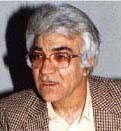December 10, 2000-Updated March 19, 2002

December 10, 2000-Updated March 19, 2002

IRAN

Nasser ZARAFCHAN
The arrest of the lawyer, Nasser Zarafshan, comes two weeks ahead of the start of the trial of what has come to be known as the serial murders case.
There were no details as to why Mr Zarafshan was arrested and whether any charges have been brought against him.
Mr Zarafshan, who was representing the families of two victims in the case, had been critical of preparations for the trial. The Iranian Intelligence Ministry admitted that some of its agents were involved in the killing.
"He had been arrested. No explanation has been given to us," a relative told AFP.
Zarafshan was arrested and detained by the authorities after speaking publicly about the slayings, a fellow attorney who spoke on condition of anonymity.
He was arrested in the wake of a warning by the head of the military justice department, Mohammad Niazi, against any unauthorised revelations about the case, due to come before the court on December 23.
He had also been summomed by the trial judge to give evidence, the lawyer said.
He was freed Wednesday December 13 on 27,000 dollars bail, the Khorassan paper said.
Zarafhsan represents the families of two writers, Mohammad Mokhtari et Mohammad Pouyandeh, who were murdered in late 1998 along with another writer, Majid Sharif, and two secular opposition figures, Daryush and Parvaneh Forouhar.
Niazi had warned that "anyone who makes speculations or revelations about the serial killings or insults or defames third parties will be prosecuted."
Earlier Zarafshan had said that the four murdered dissidents were not the only people to have been killed, adding that the assassinations followed religious decrees.
Last month investigative journalist Akbar Ganji, who is on trial in another affair, for attending an "un-Islamic" seminar in Berlin, told a revolutionary court senior figures of the regime were behind the killings.
He named in particular former intelligence minister Ali Fallahian and a senior judge, Gholam-Hossein Mohseni-Ejei.
Fallahian denied the accusation in a statement published Monday in the conservative Jomhuri Eslami daily, saying he was not in office at the time so could not be responsible.
The intelligence ministry has said that a group of its agents carried out the killings but without the knowledge or authorisation of their superiors.
A total of 18 people are to go on trial later this month but not their alleged ringleader, Said Emami, who committed suicide in prison in June 1999, according to officials.

 [IRAN : May 20 th, 2002 : Mohammad- Ali DADKHAH, Iran opposition lawyer, jailed
]
[IRAN : May 20 th, 2002 : Mohammad- Ali DADKHAH, Iran opposition lawyer, jailed
]

 [IRAN - September 27, 2000 : Attorney Shirin Ebadi, Mehrengiz Kar's defence lawyer, herself sentenced Wednesday to a five-year vocational ban in addition to a 15-month suspended prison term by a Tehran court following a closed-door trial. ]
[IRAN - September 27, 2000 : Attorney Shirin Ebadi, Mehrengiz Kar's defence lawyer, herself sentenced Wednesday to a five-year vocational ban in addition to a 15-month suspended prison term by a Tehran court following a closed-door trial. ]

 [IRAN - May 2000 : Mehrangiz KAR, a prominent human rights lawyer in Tehran detained by the Revolutionary Court ]
[IRAN - May 2000 : Mehrangiz KAR, a prominent human rights lawyer in Tehran detained by the Revolutionary Court ]
![]() IRAN -August 9, 2002 - Mr. Nasser Zarafchan was arrested on August 7th 2002 and is now being detained in Evin prison.
.
IRAN -August 9, 2002 - Mr. Nasser Zarafchan was arrested on August 7th 2002 and is now being detained in Evin prison.
.
![]()
URGENT APPEAL - THE OBSERVATORY
The Observatory has been informed by the League for the Defence of Human Rights in Iran (LDDHI) that Mr. Nasser Zarafchan was arrested on August 7th 2002 and is now being detained in Evin prison.
Mr Zarafchan, a human rights defender and the lawyer of Mrs. Sima Pouhandeh, the widow of Mohammed Djafar Pouhandeh (a writer, who was kidnapped and murdered in December 1998 by Iranian secret services agents) had been sentenced to 5 years imprisonment and sentenced to 50 lashes on July 15th, 2002, by the Military Court of Tehran. He had appealed this decision before the Supreme Court. However, despite his appeal, he was at risk of being detained at any time, since an appeal before the Supreme Court is not suspensive. His lawyer asked that Mr Zarafchanís sentence be suspended due to his poor health and due to the fact that the Military Courtís decision was not definitive.
The Observatory considers these measures against Mr. Zarafchan as being arbitrary, since they only aim at depriving him of his right to practice his legal profession.
On July 15th, 2002, the Military Court of Tehran confirmed the sentence of the Military Tribunal of Tehran, which had sentenced Mr. Nasser Zarafchan on March 18th, 2002, to three years imprisonment for "possession of firearms and alcohol". Mr. Zarafchan had also been sentenced to two years imprisonment for opinions that he had expressed during interviews with the press, concerning the trial dealing with the assassinations of Iranian intellectuals, which came to a conclusion in January 2001. He had appealed against the decision of the Tribunal.
Mr. Zarafchan's trial began on November 3rd, 2001, before the Military Tribunal of Tehran. He was first arrested on December 9th, 2000, and released on bail two weeks later. During his trial, Mr. Zarafchan was arrested and then released two days later.
The Observatory considers this condemnation as arbitrary and fears that the procedure is in contradiction with the principles of a fair and impartial trial.
Action requested :
Please write to the authorities of Iran urging them to :
i. Proceed to Mr. Zarafchan immediate release in the absence of any charges against him, and to guarantee his physical and psychological integrity in all circumstances,
ii. To guarantee that he be allowed access to adequate medical assistance during detention,
iii. Put an immediate end to the persecution and the harassment of the Iranian independent human rights defenders and allow them to act freely,
iv. Conform with the Declaration on Human Rights Defenders, adopted by the General Assembly of the United Nations on 9 December 1998, in particular its article 1 which states that "everyone has the right, individually and in association with other, to promote and to strive for the protection and realization of human rights and fundamental freedoms at the national and international levels";
v. Conform with the disposals of the Universal Declaration on Human Rights and of human rights regional and international instruments which bound the Islamic Republic of Iran.
APPEALS TO:
- His Excellency Hojjatoleslam val Moslemin Sayed Mohammad Khatami, President of the Islamic Republic, The Presidency, Palestine Avenue, Azerbaijan Intersection, Tehran (Iran); E-mail: khatami@president.ir
- His Excellency Ayatollah Mahmoud Hashemi Shahrudi, Head of the Judiciary, Ministry of Justice, Park-e Shahr, Tehran (Iran); Fax: + 98 21 879 6671
- The Iranian Embassy of your country.
Paris, Geneva, the 21st of March 2002
New Information
IRN 004/0012/OBS 125.2
Legal condemnations
Iran
21st March 2002
Background :
In December 2000, the authorities in Iran have arrested a prominent lawyer in the case of the killing and abduction of several Iranian intellectuals and dissidents two years ago.
